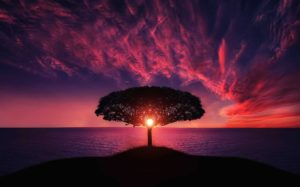I recently saw a Facebook posting by one Appalachian person toward a group of other Appalachian people that was derogatory and it broke my heart. The worst part is the person posting the comment didn’t even realize how condescending her remark was.
This reminds me of one of our greatest weaknesses as Appalachians: the lack of appreciation and valuing of our own.
Years ago I had a discussion with a neighbor in my middle class suburban neighborhood, just outside the Cincinnati city limits. She is a friend of mine and we get along very well.
She is originally from an Appalachian region near my own home so I feel a connection in our joint cultural heritage. As she spoke, she told me of experiences she had early in her nursing career in Scioto County, the neighboring county of my childhood home in Lawrence County.
She said, “We hated seeing Lawrence County people come into the emergency room. They all have pointy heads. It’s from all the inbreeding.” I was shocked and offended. I replied, “I’m from Lawrence County. Would you like to examine my head?”
This woman is highly educated. She is kind and generous. Why would she think, much less say, such a demeaning thing? Could it be that she—and we—have accepted the false stereotypes that burden our Appalachian people?
Many of these beliefs are based on fictional novels with characters that never existed. We have heard jokes, been bombarded with hillbilly logos and been taunted because of the way we talk.
As with all stereotypes of different cultures or ethnic groups, it is easier to believe a characterization of a people than to get to know the people or culture personally.
I’ve come to expect those from outside the Appalachian region to accept the false characterizations of our people. When I first left my home region I had to deal with outsiders who openly mocked my way of talking and some who even expressed that if I wanted to be successful in my career I should consciously work to change my accent.

I found I had to work harder than others to prove my intelligence and abilities. When I did, the outsiders thought I was an outlier of my culture, because they believed most from Appalachia are simple-minded.
The woman who made the offensive Facebook posting is Appalachian by birth and heritage. She is intelligent, with a college degree and an impressive resume.
She lives in a nice house in a respectful neighborhood near a larger city of the area. She belongs to clubs and organizations that constantly affirm her good standing in the community.
The subjects of her posting were fellow Appalachian residents who live farther into the remote areas of the county, those in the hills and hollers.
These people may or may not have college educations or impressive resumes. If they do you won’t hear them bragging about it. The clubs they belong to tend to be informal community gatherings or small churches. Their houses tend to be modest.
These are practical people in the way they dress, decorate their homes and problem solve. They may or may not use proper grammar, but their speech is honest and usually kind.
Their greatest treasure is their family, especially the children. And their generosity knows no bounds, if they see a need they seek to meet it.
To be honest I feel most at home with the more ‘country’ Appalachian residents. They accept me for who I am. When I go home it’s as though I never left. We talk and laugh not about worldly accomplishments, but about things that matter, like “Is you mom doing better? How are the kids? Remember when we did…?”
My point is we must take care of each other. We Appalachians are of the same heritage. Our ancestors had the same struggles and taught us how to survive.
Whether we live in the more ‘progressive’ sections of a city or in the holler, we must appreciate our people. Until we do, how can we expect those outside our heritage to value us?
 Nora Stanger
Nora Stanger
Contributing Writer


